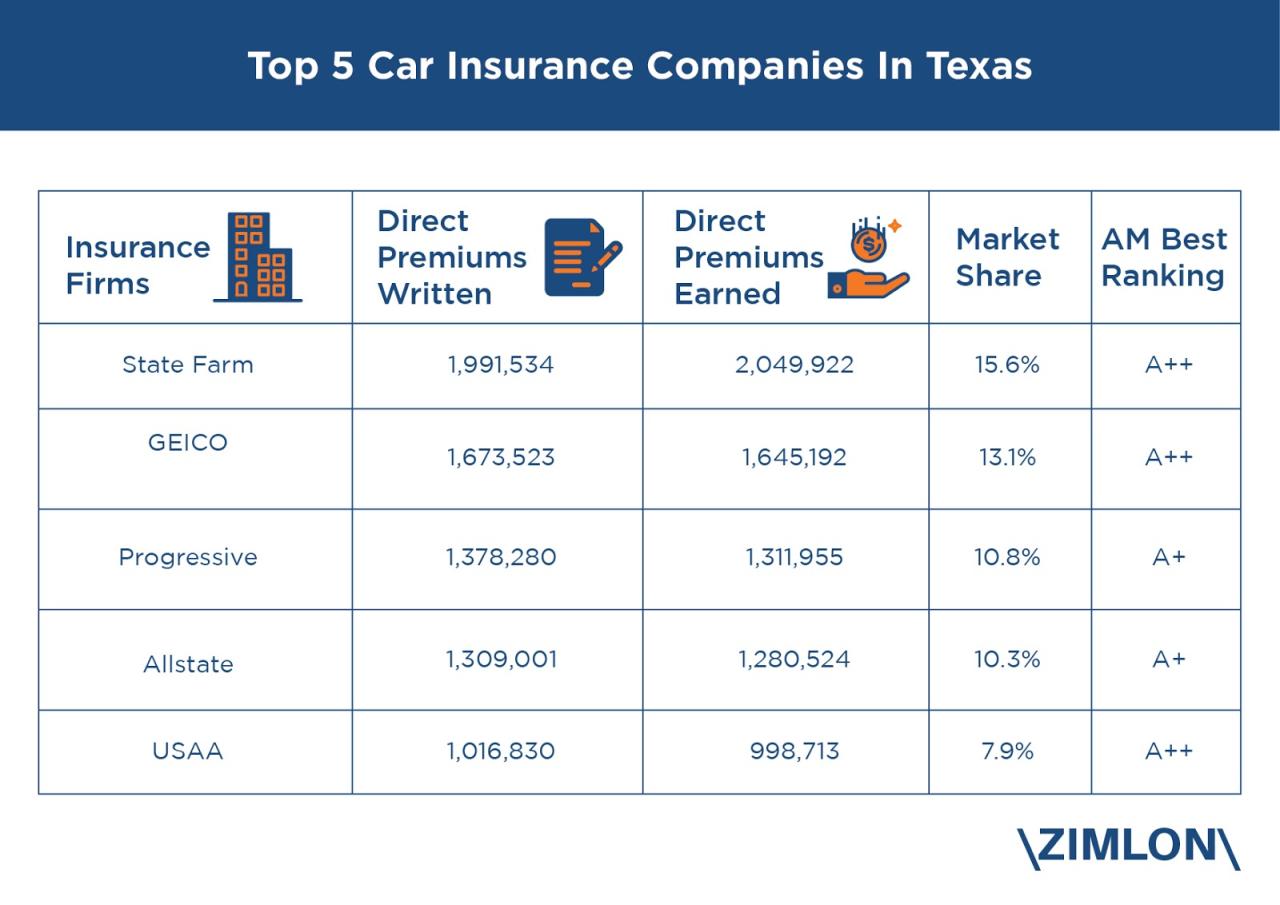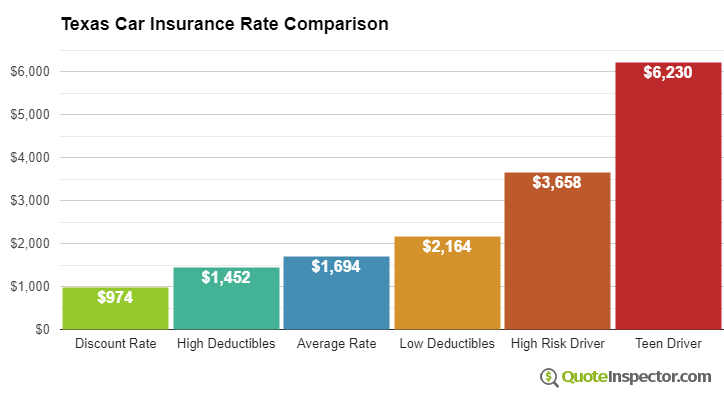Car insurance in Texas is a necessity for all drivers, ensuring financial protection in the event of an accident. Navigating the complex world of car insurance can be daunting, especially with the various types of coverage, factors influencing rates, and regulations to consider. This guide aims to provide comprehensive information on Texas car insurance, empowering you to make informed decisions and secure the right coverage for your needs.
From understanding mandatory requirements and penalties for driving without insurance to exploring factors affecting premiums, choosing the right policy, and filing claims, we delve into the intricacies of Texas car insurance. We’ll also cover common discounts, options for high-risk drivers, and specific needs of young drivers, seniors, and commercial vehicle owners.
Understanding Texas Car Insurance Requirements: Car Insurance In Texas
Driving in Texas comes with certain responsibilities, and one of the most crucial is having the right car insurance coverage. Texas law mandates specific types of insurance for all drivers, ensuring financial protection in case of accidents.
Texas’s Mandatory Car Insurance Coverage
Texas requires all drivers to carry at least the following types of insurance:
- Liability Coverage: This covers damages to other people’s property or injuries sustained by others in an accident caused by you. It includes two parts:
- Bodily Injury Liability: This covers medical expenses, lost wages, and other related costs for people injured in an accident caused by you. Texas requires a minimum of $30,000 per person and $60,000 per accident.
- Property Damage Liability: This covers repairs or replacement costs for property damaged in an accident caused by you. Texas requires a minimum of $25,000 per accident.
- Uninsured/Underinsured Motorist Coverage: This protects you if you are involved in an accident with a driver who is uninsured or has insufficient insurance to cover your damages. Texas requires a minimum of $30,000 per person and $60,000 per accident for bodily injury, and $25,000 for property damage.
Penalties for Driving Without Required Insurance, Car insurance in texas
Driving in Texas without the mandatory insurance coverage can lead to serious consequences. These penalties can include:
- Fines: You could face a fine of up to $350 for driving without insurance. The fine can be higher for repeat offenses.
- License Suspension: Your driver’s license can be suspended if you are caught driving without insurance. This can prevent you from driving legally until you provide proof of insurance and pay any outstanding fines.
- Vehicle Impoundment: Your vehicle can be impounded if you are caught driving without insurance. You will need to pay a fee to have your vehicle released.
- Court Costs: If you are involved in an accident without insurance, you may be responsible for court costs and other legal expenses.
Types of Car Insurance Coverage in Texas
While Texas mandates only liability and uninsured/underinsured motorist coverage, other types of insurance can provide comprehensive protection for you and your vehicle. Here’s a breakdown of the different types of car insurance coverage available in Texas:
- Collision Coverage: This covers damages to your vehicle in an accident, regardless of fault. It helps pay for repairs or replacement costs, minus your deductible.
- Comprehensive Coverage: This covers damages to your vehicle from events other than collisions, such as theft, vandalism, fire, hail, or natural disasters. It helps pay for repairs or replacement costs, minus your deductible.
- Medical Payments Coverage (Med Pay): This covers medical expenses for you and your passengers, regardless of fault, in case of an accident. It helps pay for medical bills, lost wages, and other related costs.
- Personal Injury Protection (PIP): This is similar to Med Pay, but it also covers lost wages and other expenses related to your injuries. It is optional in Texas but can be a valuable addition to your coverage.
- Rental Reimbursement: This helps pay for a rental car while your vehicle is being repaired after an accident.
- Roadside Assistance: This provides help in case of a breakdown or other roadside emergencies, such as flat tires, battery jumps, or towing.
Factors Affecting Car Insurance Rates in Texas
Your car insurance premiums in Texas are influenced by several factors. Understanding these factors can help you make informed decisions to potentially lower your costs.
Driving History
Your driving history plays a crucial role in determining your insurance rates. Insurance companies carefully examine your driving record to assess your risk. A clean driving record with no accidents or violations usually translates to lower premiums. Conversely, a history of accidents, traffic violations, or DUI convictions can significantly increase your rates.
For example, a driver with multiple speeding tickets might face higher premiums compared to a driver with a clean record.
Age
Age is another significant factor affecting car insurance rates in Texas. Younger drivers, particularly those under 25, are statistically more likely to be involved in accidents. This increased risk is reflected in higher insurance premiums. As drivers age and gain more experience, their premiums tend to decrease.
For instance, a 18-year-old driver will generally pay higher premiums than a 35-year-old driver with a similar driving record.
Vehicle Type
The type of vehicle you drive is a key factor in determining your insurance rates. Certain vehicle types are considered riskier than others, leading to higher premiums. Factors like the vehicle’s safety features, value, and repair costs are considered.
For example, a high-performance sports car with a high market value and potentially expensive repairs might incur higher insurance premiums compared to a more affordable and reliable sedan.
Location
Your location in Texas can also influence your car insurance rates. Insurance companies consider factors like the density of population, traffic congestion, and crime rates in your area.
For example, drivers residing in urban areas with higher traffic volume and crime rates may face higher premiums compared to those in rural areas with lower traffic and crime rates.
Credit Score
In Texas, insurance companies can use your credit score as a factor in determining your car insurance rates. A good credit score generally indicates financial responsibility, which is associated with a lower risk of claims.
For example, a driver with a good credit score may qualify for lower premiums compared to a driver with a poor credit score.
Filing a Car Insurance Claim in Texas

Filing a car insurance claim in Texas is a necessary step when you’ve been involved in an accident. Understanding the process and knowing what to do can help ensure a smooth and successful claim.
Types of Claims in Texas
When filing a car insurance claim in Texas, you can file for various types of coverage, depending on the circumstances of the accident.
- Collision Coverage: This coverage pays for repairs to your vehicle if you’re involved in an accident, regardless of who is at fault.
- Comprehensive Coverage: This coverage covers damage to your vehicle caused by events other than a collision, such as theft, vandalism, fire, or natural disasters.
- Liability Coverage: This coverage pays for damages to other people’s property or injuries they sustain in an accident if you are at fault.
- Personal Injury Protection (PIP): This coverage pays for your medical expenses, lost wages, and other related expenses, regardless of who is at fault.
- Uninsured/Underinsured Motorist Coverage: This coverage protects you if you are involved in an accident with a driver who does not have insurance or does not have enough insurance to cover your damages.
Steps to File a Car Insurance Claim in Texas
Here’s a step-by-step guide to filing a car insurance claim in Texas:
- Report the Accident: Immediately contact your insurance company to report the accident. Provide all the necessary details, including the date, time, location, and circumstances of the accident.
- Gather Information: Collect as much information as possible about the accident, including the other driver’s name, insurance information, and contact details. If there are any witnesses, get their names and contact information as well.
- File a Claim: Contact your insurance company to file a claim. They will provide you with the necessary forms and instructions.
- Provide Documentation: Provide your insurance company with all the required documentation, such as a police report, medical records, and repair estimates.
- Cooperate with the Insurance Company: Be cooperative with your insurance company throughout the claims process. Respond to all their requests for information promptly and accurately.
Tips for a Smooth Claims Process
Following these tips can help ensure a smooth claims process:
- Report the accident promptly: The sooner you report the accident, the better.
- Be honest and accurate: Provide your insurance company with accurate and truthful information.
- Keep detailed records: Maintain detailed records of all communications and documents related to your claim.
- Understand your policy: Familiarize yourself with your insurance policy to understand your coverage and limits.
- Consult with an attorney: If you have any questions or concerns about your claim, consider consulting with a qualified attorney.
Texas Car Insurance Laws and Regulations

Texas has specific laws and regulations governing car insurance. Understanding these rules is crucial for drivers in the state, as they dictate the minimum coverage requirements, the role of the state’s insurance department, and the protection offered to consumers.
Texas Department of Insurance
The Texas Department of Insurance (TDI) plays a vital role in regulating the state’s insurance industry, including car insurance. Its primary responsibilities include:
- Licensing and supervising insurance companies operating in Texas.
- Enforcing state insurance laws and regulations.
- Protecting consumers from unfair or deceptive insurance practices.
- Resolving disputes between insurance companies and policyholders.
- Educating the public about insurance matters.
The TDI ensures that insurance companies operate fairly and provide adequate coverage to Texas drivers.
Texas Car Insurance Requirements
Texas law mandates that all drivers carry a minimum amount of liability insurance, known as the “Texas Financial Responsibility Law.” This law aims to ensure that drivers are financially responsible for any damages or injuries they cause to others in an accident.
- Liability Coverage: This coverage protects you from financial liability if you cause an accident that injures someone or damages their property. The minimum requirements are:
- $30,000 per person for bodily injury liability.
- $60,000 per accident for bodily injury liability.
- $25,000 per accident for property damage liability.
- Uninsured/Underinsured Motorist Coverage (UM/UIM): This coverage protects you if you are involved in an accident with a driver who is uninsured or underinsured. The minimum requirements are:
- $30,000 per person for bodily injury liability.
- $60,000 per accident for bodily injury liability.
It’s crucial to understand that these minimum requirements may not be enough to cover all potential costs in a serious accident. Drivers are encouraged to consider purchasing additional coverage to protect themselves financially.
Consumer Protection Resources in Texas
The TDI provides several resources to help consumers understand their rights and options regarding car insurance. These resources include:
- TDI Website: The TDI website offers a wealth of information about insurance laws, consumer rights, and tips for choosing the right insurance policy.
- Consumer Hotline: The TDI operates a consumer hotline that provides answers to insurance-related questions and assists with resolving insurance disputes.
- Complaints Process: Consumers can file complaints with the TDI if they believe an insurance company has violated state laws or regulations.
- Mediation Services: The TDI offers mediation services to help resolve disputes between consumers and insurance companies.
These resources empower consumers to navigate the insurance process effectively and ensure fair treatment.
Concluding Remarks
Armed with the knowledge and insights gained from this guide, you can confidently navigate the Texas car insurance landscape. Remember, securing the right coverage and understanding your policy’s terms are crucial steps towards peace of mind on the road. With careful consideration and planning, you can find the optimal car insurance solution that meets your specific needs and budget.
Car insurance in Texas is a necessity for all drivers, and it’s important to find the right coverage to meet your needs. While you’re thinking about protecting your car, it’s also a good idea to consider insurance for business liability if you own or operate a business.
This type of insurance can help protect your company from financial losses in case of accidents or lawsuits, ensuring your business stays safe and secure, just like your car insurance protects your vehicle.
